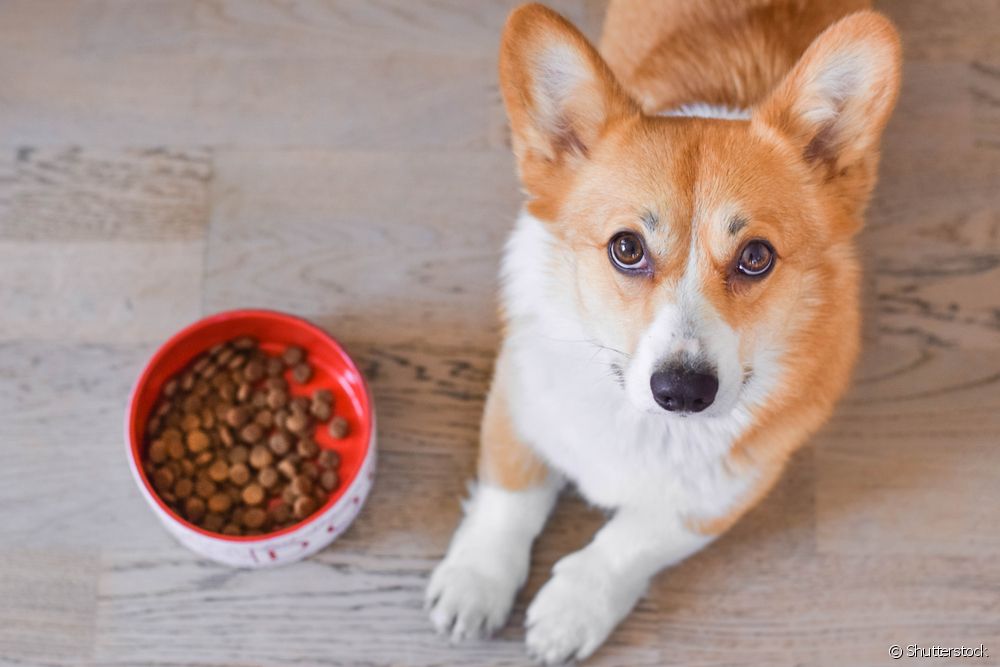Light dog food: in which cases is it recommended? How is it different from traditional dog food?

Table of contents
Among the different types of dog food that exist, the light food stands out as an alternative for animals that are in the ideal weight range or slightly overweight. It is usually indicated for dogs that need to maintain the same weight or lose very little weight, but it is not advisable for pets that have been diagnosed with obesity. In this case, diet dog food is recommended.the best option, which is a totally different food from light dog food. To understand how this type of food works, in which cases light dog food is indicated and how to insert it into your pet's daily life, we talked to veterinarian Nathalia Breder, who specializes in animal nutrition. Come see what she told us!
See_also: 5 tips to prevent giardia in dogsIs light dog food and diet dog food the same thing?
This is a very common question among pet parents, and the answer is no: light dog food and diet dog food are not the same thing. The first option is indicated mainly for animals that are in the weight maintenance phase or that are overweight below 15%. In some cases, light dog food can also serve as a preventive measure, especially when the puppy has a low weight.predisposition to obesity - but it is important to talk to a veterinarian first to discuss this possibility.
Animals that have been diagnosed with canine obesity - that is, that are overweight by more than 15% - need another type of food intervention to help with weight loss treatment. Usually, diet dog food or specific for obesity are the best options for dog food to lose weight. It is important to emphasize that before introducing light food ordiet food, dogs need a consultation with a veterinarian, preferably with specialization in the field of nutrition.
Light dog food helps maintain a healthy weight
Light dog food works quite simply: because it is lower in calories than traditional dog food, it helps dogs maintain the weight considered "ideal" and even facilitates weight loss for the pet that is slightly overweight. "The main function of light dog food is to maintain healthy weight for adult animals, or to control overweight for those pets that need to lose weightlittle," says Nathalia.
After neutering a dog, the guardian should consider investing in a light dog food for neutered dogs - always with the guidance of the veterinarian, of course. Many animals end up gaining weight after castration, and a good way to prevent overweight from becoming obesity is to offer less caloric food to your four-legged friend. The formulation of the light food is ideal becausehas all the nutrients that the animal needs in the right proportions, so that the puppy stays healthy and in good shape.
See_also: 5 ways to prevent urinary tract infection in cats
What is the best dog food for weight loss?
For those looking for a dog food for obese dogs - small or large breeds - the light version is far from the best option. In addition to diet food, there are specific foods for canine obesity, which consist of foods with a lower percentage of fat in their composition. Medical monitoring, however, should not be left aside at any time. Even if the dog food for obese doghelps the pet to lose weight, it is important to be careful that it does not leave the dog too thin and malnourished. Ideally, when the animal reaches the ideal weight, changes are made to its diet so that it remains healthy - and that is where light dog food usually comes in.
But remember: for your dog to lose weight, it is not enough to focus only on the best food. Weight loss also requires a routine with physical exercise and other activities. It is also important to check that the food for obese dogs is suitable for the age and physical size of your pet.
Light food: in which cases can dogs adopt this diet?
Light dog food can be included in your four-legged friend's diet in two different cases: if the dog is at its ideal weight or slightly overweight. "We recommend light food for animals that are already at their ideal weight, as a way of maintaining that healthy weight," says Nathalia. If the dog is up to 15% overweight, the veterinarian explains that it is possible touse the light food in a smaller quantity to promote the pet's weight loss.
It is worth noting that light dog food - small or large breeds - should not be adopted without the guidance of a professional, as it is necessary to make an assessment of each case to find out if the dog fits the situations mentioned.
Learn how to transition to light dog food
Before introducing light food, dogs need to get used to the food gradually. It is necessary to understand that the organism of dogs is very different from humans: they do not adapt easily to food changes and, therefore, the transition must occur gradually. "A sudden change can lead to a gastroenteritis condition", highlights the veterinarian. Thus, the ideal is that the introductionThe transition from traditional to light food happens gradually, taking an average of 10 days. Here's how to do it:
- Day 1: use 90% of the old ration and 10% of the light ration;
- Day 2: use 80% of the old ration and 20% of the light ration;
- Each day, increase the amount of the light dog food by 10% and decrease the amount of the old dog food by 10%.
- On the 9th day, the percentage should be 10% of the old dog food and 90% of the light dog food.
- From the 10th day of transition, the pet will eat exclusively light food.

